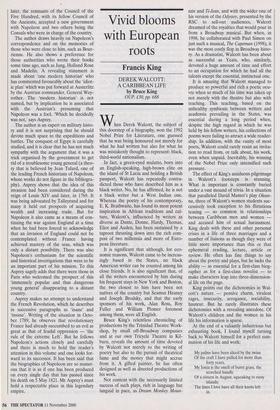Vivid blooms with European roots
Francis King
DEREK WALCOTT: A CARIBBEAN LIFE by Bruce King OUP, £30, pp. 688 When Derek Walcott, the subject of this doorstep of a biography, won the 1992 Nobel Prize for Literature, one guessed that he was being honoured not merely for what he had written but also for what he was mistakenly thought to represent: black, third-world nationalism.
In fact, a green-eyed mulatto, born into an English-speaking, high-brown elite on the island of St Lucia and holding a British passport, Walcott has repeatedly contra- dicted those who have described him as a black writer. No, he has affirmed, he is not a black writer but a West Indian one. Whereas the poetry of his contemporary, E. K. Brathwaite, has found its most potent inspiration in African traditions and cul- ture, Walcott's, influenced by writers as diverse as Dante, Donne, Hardy, Thomas, Eliot and Auden, has been sustained by a taproot thrusting down into the rich com- post of two millennia and more of Euro- pean literature.
It is significant that although, for eco- nomic reasons, Walcott came to be increas- ingly based in the States, no black American writer can be counted among his close friends. It is also significant that, of all the writers encountered by him during his frequent stays in New York and Boston, the two closest to him have been not natives of the country but Seamus Heaney and Joseph Brodsky, and that the early sponsors of his work, Alan Ross, Roy Fuller and William Plomer foremost among them, were all English.
Bruce King's relentless chronicling of productions by the Trinidad Theatre Work- shop, by small off-Broadway companies and at our own Tricycle Theatre in Kil- burn, reveals the amount of time devoted by Walcott not merely to the writing of poetry but also to the pursuit of theatrical fame and the money that might accrue from it. A gifted painter, he has often designed as well as directed productions of his work.
Not content with the necessarily limited success of such plays, rich in language but languid in pace, as Dream Monkey Moun- tain and Ti-Jean, and with the wider one of his version of the Odyssey, presented by the RSC to sell-out audiences, Walcott dreamed of the royalties that would pour in from a Broadway musical. But when, in 1998, he collaborated with Paul Simon on just such a musical, The Capeman (1998), it was the most costly flop in Broadway histo- ry. As a dramatist, Walcott has been about as successful as Yeats, who, similarly, devoted a huge amount of time and effort to an occupation for which he had all the talents except the essential, instinctual one.
It is amazing that Walcott managed to produce so powerful and rich a poetic oeu- vre when so much of his time was taken up not merely with the theatre but also with teaching. This teaching, based on the unhealthy symbiosis between writers and academia prevailing in the States, was essential during a long period when, despite the high regard in which he was held by his fellow writers, his collections of poems were failing to attract a wide reader- ship. In addition, with the vanity of most poets, Walcott could rarely resist an invita- tion to read from, or talk about, his work, even when unpaid. Inevitably, his winning of the Nobel Prize only intensified such pressure.
The effect of King's assiduous pilgrimage in Walcott's footsteps is stunning. What is important is constantly buried under a vast mound of trivia. In a situation that paralleled David Mamet's play Olean- na, three of Walcott's women students suc- cessively took exception to his flirtatious teasing — so common in relationships between Caribbean men and women and accused him of sexual harassment. King deals with these and other personal crises in a life of three marriages and a number of liaisons as though they were of little more importance than this or that ephemeral reading, lecture, article or review. He often has fine things to say about the poetry and plays, but he lacks the ability — as essential for a first-class biog- rapher as for a first-class novelist — to make characters leap into three-dimension- al life on the page.
King points out the dichotomies in Wal- cott's nature — pensive charm, virulent rages, insecurity, arrogance, sociability, hauteur. But he rarely illustrates these dichotomies with a revealing anecdote. Of Walcott's children and the women in his life his information is sparse.
At the end of a valiantly industrious but exhausting book, I found myself turning back to Walcott himself for a perfect sum- mation of his life and work:
My palms have been sliced by the twine Of the craft I have pulled for more than forty years, My Ionia is the smell of burnt grass, the scorched handle Of a cistern in August, squeaking to rusty islands; The lines I love have all their knots left in.


























































































 Previous page
Previous page